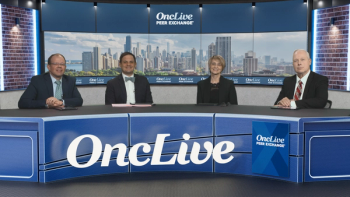Articles by Kristen M. O’Dwyer, MD

Panelists discuss collaboration strategies for chimeric antigen receptor (CAR) T-cell therapy referral, reflections on advancements in relapsed/refractory acute lymphoblastic leukemia (R/R ALL) throughout 2024, key accomplishments, and future opportunities for progress in 2025.

Panelists discuss strategies for managing transitions of care for chimeric antigen receptor (CAR) T-cell therapy patients, including monitoring for long-term toxicities as well as the feasibility and logistics of administering CAR T therapy in the outpatient vs inpatient setting.

Panelists discuss routine laboratory monitoring for cytokine release syndrome (CRS) and immune effector cell–associated neurotoxicity syndrome (ICANS) as well as insights from the American Society of Hematology Annual Meeting and Exposition (ASH 2024) data on health care resource utilization and costs associated with administering chimeric antigen receptor (CAR) T-cell therapy and managing related toxicities.

Panelists discuss future directions and unmet needs for chimeric antigen receptor (CAR) T-cell therapy in relapsed/refractory (R/R) B-cell acute lymphocytic leukemia (ALL) as well as risk factors that may predict higher likelihoods of severe cytokine release syndrome (CRS) and immune effector cell–associated neurotoxicity syndrome (ICANS) in patients undergoing treatment.

Panelists discuss the impact of blinatumomab’s FDA approval on sequencing chimeric antigen receptor (CAR) T-cell therapy for relapsed/refractory acute lymphoblastic leukemia (R/R ALL), the use of bridging therapies prior to CAR T infusion, and approaches to consolidation or maintenance treatment following CAR T therapy.

Panelists discuss how minimal residual disease (MRD) outcomes with obecabtagene autoleucel (obe-cel) compare with those with brexucabtagene autoleucel (brexu-cel) and how the FDA approval of obe-cel may impact treatment decisions in relapsed/refractory acute lymphoblastic leukemia (R/R ALL), including considerations for patient factors, such as MRD status, Philadelphia status, and high-risk features.

Panelists discuss how real-world outcomes data from the CIBMTR registry on brexucabtagene autoleucel (brexu-cel) presented at the American Society of Hematology Annual Meeting and Exposition (ASH 2024) align with clinical practice, as well as the key findings from the FELIX trial, including minimal residual disease (MRD) outcomes and comparisons with the ZUMA-3 trial for obecabtagene autoleucel (obe-cel) in relapsed/refractory acute lymphoblastic leukemia (R/R ALL).

Panelists discuss how the dosing and lymphodepletion regimens of brexucabtagene autoleucel (brexu-cel), tisagenlecleucel (tisa-cel), and obecabtagene autoleucel (obe-cel) differ, with insights into obe-cel’s double infusion approach, as well as a deeper dive into the ZUMA-3 trial’s design and data updates with brexu-cel in relapsed/refractory acute lymphoblastic leukemia (R/R ALL).

Panelists discuss how the recent FDA approval of obecabtagene autoleucel (obe-cel) for relapsed/refractory acute lymphoblastic leukemia (R/R ALL) adds to the existing chimeric antigen receptor (CAR) T-cell therapies, with a focus on the differences in their mechanisms, structures, and FDA indications.


